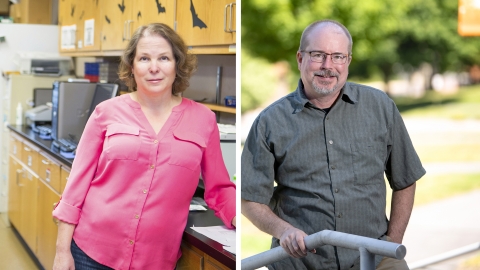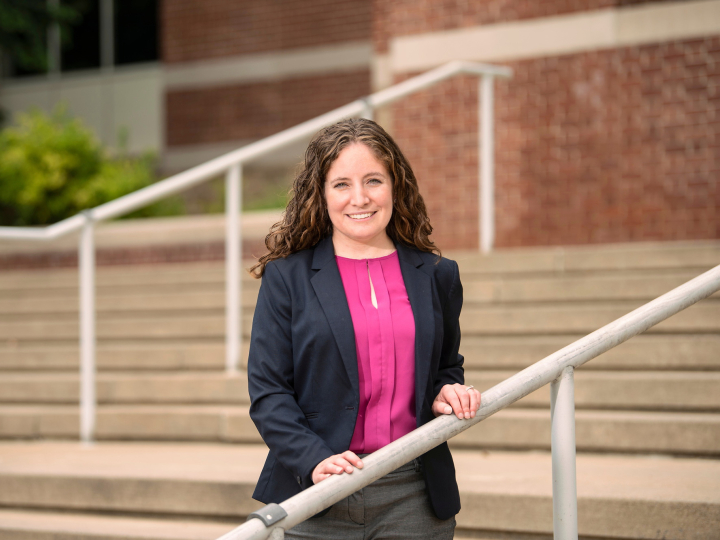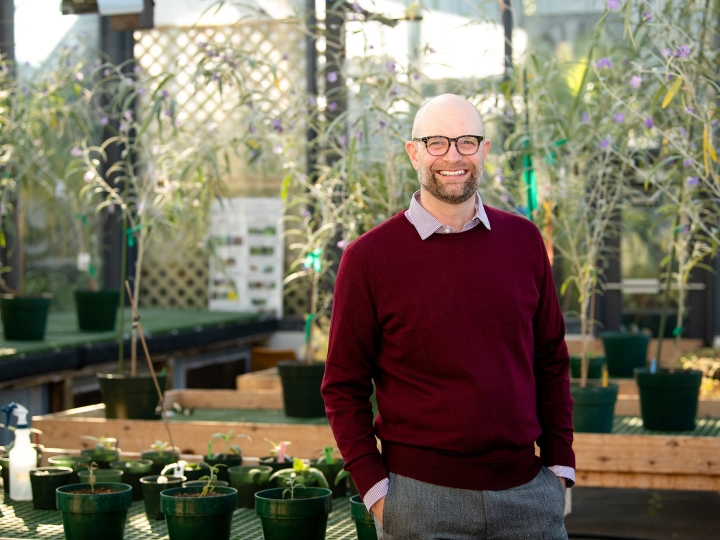
Bucknell Biology Professors Awarded $2.9 Million Grant to Study African Bats, Viruses
March 4, 2021
Biology professors DeeAnn Reeder and Ken Field are accomplished bat researchers. Photos by Brett Simpson Photography and Emily Paine, Communications
Before COVID-19, the 2014-16 Ebola epidemic was the last major global health scare, and now there are fresh outbreaks of Ebola in the African nations of Guinea and the Democratic Republic of Congo. A common denominator in both COVID-19 and Ebola outbreaks is the role bats may have played in the eventual transmission to humans.
Bucknell University biology professors DeeAnn Reeder and Ken Field have just been awarded a $2.9 million grant by the National Institute of Allergy and Infectious Diseases (NIAID) for research to gain a better understanding of that role, specifically as it relates to Ebola. Their five-year study will take them to Uganda with a small number of Bucknell undergraduate students to study three native bat species — fruit, free-tailed and horseshoe — that have varying potential links to the spread of the Ebola virus.
One of the largest research grants in Bucknell history, the award will enable the researchers to investigate the unique physiology of bats and how that enables them to act as hosts for deadly diseases that can spill over to humans.
"This is a critical part of pandemic preparedness. We need to understand better the disease ecology of viruses of pandemic potential and the role bats may play in the transmission of those viruses," says Reeder, who has previously advised U.S. and African authorities on infectious diseases, including Ebola.
"A number of researchers do these kinds of studies in the lab, where you may have some bats cells that you can infect with some viral antigens, and you learn a lot that way. But it's not the same as doing the work in free-ranging animals, living under their own natural conditions," she adds. "So it really fills a gap, because there are very few people doing this work the way we're doing it."
The Bucknell researchers initially planned to go to Uganda this summer, but the COVID-19 pandemic will prevent that travel. They will now prepare pilot studies at the University that will develop and test the methods they'll employ in Uganda. They'll also hire a post-doctoral research fellow to coordinate the research and work with Bucknell students on the project.
Next summer, the Bucknell researchers are optimistic they'll be able to make the trip with one to two undergraduate students. They'll begin by capturing bats and setting up flight cages for short-term bat housing. They'll then challenge the bats with Ebola virus proteins that will simulate viral infection. Reeder says the project will still require the researchers to wear heavy personal protective "spacesuit" equipment with extensive safety protocols, but they won't be working with the virus that infects humans.
"We're using a proxy, so we're not out there handling Ebola viruses," she says. "We're using something that's been developed as a vaccine called a virus-like particle, or VLP. It's very similar to some of the COVID vaccines in that we're taking a protein from the Ebola virus and creating a VLP that can trick the bat's immune systems into thinking they have just seen Ebola. How different bats respond to this challenge will inform us about which bats may be likely reservoirs, and about how bats manage viral infection in general."
By the final two years of the project, Reeder says she and Field hope to test how bats' ability to rapidly raise their temperature during flight and then dramatically lower it at rest may play a role in their immunity to carrying viruses that are deadly to humans.
"By understanding the ways bats react to viral infections in the wild, we will be better able to predict which conditions and bat species might play a role in the next pandemic spillover," says Field.
Some experimental samples will be brought back to Bucknell and kept in a dedicated negative 80-degree Celsius freezer with restricted access for further analysis. Students from Field's Advanced Data Analysis and Bioinformatics course will also conduct high-level analysis of the data generated through the project, completing a comprehensive undergraduate student research experience.
"I think the combination of fieldwork, lab work and bioinformatics work is really what excites me most about this, and getting students involved in each of those aspects," Field says. "Of course, the fieldwork is the most complicated aspect of it because it takes place under challenging conditions. Thankfully, we will rely not only on our own experience in the region but also upon our strong partnership with Muni University in Uganda."
Three Muni faculty members, including Imran Ejotre, who got his M.S. at Bucknell, are investigators in the grant, along with a researcher from Germany. Reeder says she is "especially excited to include Muni students in the work and to provide training on new equipment that will be gifted to the university, thereby enhancing its infrastructure and scientific capacity."

